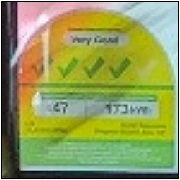|
~Coxy posted:
I get that where you're coming from is trying to make it sound ridiculous for people to say that "wow people would PREFER that they threw out PSUs more often?!", but PSUs are sort of a special case in this mindset of being thrifty or "reducing e-waste" or "maximizing parts lifetimes" because it's specifically a thing that can take out the whole rest of your computer if it burns out it's not the same as saying that "people hang on to video cards for too long anyway"
|
|
|
|

|
| # ? Apr 28, 2024 05:56 |
|
Harik posted:That's not what "idle" power means. Idle power is when it's off, just wasting energy waiting on someone to press the power button. Minimal current to keep the USB (and possibly ethernet) circuitry on for wakeup events. That's not how it's been explained in the press, and in that Linus Tech Tips video that was posted earlier, he showed a drop in desktop idle power draw (measured at the wall) from around 60 watts to 30 watts when switching to an ATX12VO PSU on an otherwise identical build. Current 80plus certification doesn't even bother measuring efficiency below 20% load, and ATX12VO is meant to be much more efficient at that.
|
|
|
|
~Coxy posted:
There's a reason only the absolute best, overspecced, titanium PSUs have 10-12yr warranties. That's way too long to use a PSU and there is a non-zero chance that it fails and takes out other components. What model is it and what's the load you've had it under?
|
|
|
|
Dr. Video Games 0031 posted:That's not how it's been explained in the press, and in that Linus Tech Tips video that was posted earlier, he showed a drop in desktop idle power draw (measured at the wall) from around 60 watts to 30 watts when switching to an ATX12VO PSU on an otherwise identical build. Current 80plus certification doesn't even bother measuring efficiency below 20% load, and ATX12VO is meant to be much more efficient at that.
|
|
|
|
BurritoJustice posted:There's a reason only the absolute best, overspecced, titanium PSUs have 10-12yr warranties. That's way too long to use a PSU and there is a non-zero chance that it fails and takes out other components.
|
|
|
|
Shipon posted:i would hope that a component would be usable for its warranty period. if that's a 10 year period then why shouldn't you be able to use it for that length? if it's a cheaper one with a 3 year warranty yeah you're probably a fool to hang onto it longer The "way too long" part was in reference to the guy saying he's held onto his current one for fifteen years. That thing's a ticking time bomb.
|
|
|
|
Harik posted:perplex was looking for sub-15w which is sleep mode, not idle. Nah, today's mini PCs from OEMs will idle in the 8-12 watt range. Not sure you can hit 15 watts with a GPU in there, but it might be possible. They were talking about moving old gaming PCs to server duty, not actual rack mounted servers.
|
|
|
|
I have been using an Intel NUC as a home server for 4+ years now, and am very happy with it over the previous repurposed desktop. 15W TDP, much lower idle power. Where “idle” means having a dozen services including Plex and several custom Spring Boot apps sitting there ready to respond.
|
|
|
Twerk from Home posted:I have been using an Intel NUC as a home server for 4+ years now, and am very happy with it over the previous repurposed desktop. When talking about idle power, what matters is how much time the CPU spends at the different ACPI C-levels where either a core or the core and its cache is turned off.
|
|
|
|
|
Also, what's really being discussed is the power being drawn by your system measured at the wall, not the power being consumed by your core components. A better power supply will consume less electricity, but it won't change the figures you see in hwinfo at all. But if you're using such a low-power machine and it has a low-power power supply to match, then it should be reasonably efficient.
|
|
|
|
Harik posted:That's not what "idle" power means. Idle power is when it's off, just wasting energy waiting on someone to press the power button. Minimal current to keep the USB (and possibly ethernet) circuitry on for wakeup events. that's actually "phantom power", not idle power. idle power is power when the machine is running but idle. but yeah servers actually have relatively obscene idle power, as do HEDT systems built on those same platforms. My X99 system did not idle down very well at all, I think it idled at about 120W at the wall even without XMP or other things enabled. generally, in the server world nobody cares, because deployments tend to be specced to the actual hardware needs (you don't deploy hardware you don't think you're going to use), and in some environments you can migrate workloads between hosts and power off the system if you have too many systems idle. Plus in general the costs are just minimal in terms of "cost of doing business" - a server that idles at 200W with electricity costing 8c per kWh costs $11.52 a month, in the grand scheme of things nobody cares about your server room burning 500 bucks a month in "excess" power.
|
|
|
|
IDK, I’ve heard that power efficiency is a pretty important figure of merit for datacenters—like I’ve heard that some of them distribute DC power instead of AC power in the building, to improve power efficiency. And often they are built in areas with inexpensive electricity, like near dams.
|
|
|
|
i find it hard to care about power draw if we're in the ~100W range. Not sure what trying to optimize that further gets you - you're not saving that much in electricity costs and i think the heat output is negligible
|
|
|
|
PSUs being ticking time bombs is loving snake oil. Prophylactically replacing "old" PSUs (how old? 10 years? 5 years?) that are working perfectly well is a complete waste of money.
|
|
|
|
shrike82 posted:i find it hard to care about power draw if we're in the ~100W range. Not sure what trying to optimize that further gets you - you're not saving that much in electricity costs and i think the heat output is negligible Rough rule of thumb is each watt is a dollar per year, so $100 or ~$8/month. It's not nothing, especially at scale. 12.1 million PCs is enough power for time travel.
|
|
|
|
~Coxy posted:PSUs being ticking time bombs is loving snake oil. Yeah, usually it's super overstated. But 15 years for what is likely a mid range bronze unit is really pushing it. Capacitors inevitably degrade over time, that's not snake oil.
|
|
|
|
Inept posted:Rough rule of thumb is each watt is a dollar per year, so $100 or ~$8/month. It's not nothing, especially at scale. 12.1 million PCs is enough power for time travel. sure but on an individual basis, speccing out a home server that sips 25/50W versus 100+W often leads to other compromises i was enthusiastic about power efficient APUs and NUCs for a while conceptually
|
|
|
|
BurritoJustice posted:Yeah, usually it's super overstated. But 15 years for what is likely a mid range bronze unit is really pushing it. Capacitors inevitably degrade over time, that's not snake oil. Makes me wonder what the longevity of the electrolytics in higher end PSUs is like compared to those in 80+ bronze ones. My 13-year-old 750W 80+ platinum is still chugging away happily, knock on wood.
|
|
|
|
A lot of it has to do with how dirty the power is in your area too.
|
|
|
|
silence_kit posted:IDK, I’ve heard that power efficiency is a pretty important figure of merit for datacenters—like I’ve heard that some of them distribute DC power instead of AC power in the building, to improve power efficiency. And often they are built in areas with inexpensive electricity, like near dams. I'm sure that's true, but more for full load power usage.
|
|
|
|
Its mostly worth updating your PSU to get modular and or braided cables and fan off modes. I'm not ever going back you CANT MAKE ME.
|
|
|
|
PSU chat again but is it a strict rule that the more your PSU spends it lifetime at high load, the quicker it'll degrade? Or rather in the converse, does it extend the lifetime of your PSU if it operates way below it's rating? Or does it have a sweet spot in terms of component longevity the way it does in terms of efficiency such as that running your PSU at 65% load of it's rating (or whatever) is actually beneficial for lifespan?
|
|
|
|
A PSU from a reputable manufacturer probably isn't going to explode, but I would say it's worth replacing aged units to dodge data loss from random shutdowns under load. That's probably more applicable to gaming rigs than home server deals though since gaming puts a lot more stress on the PSU. You probably want to run it as a risk analysis as well - if I'm upgrading a machine with a thousand dollars in new parts, I'm gonna go ahead and replace the ten year old PSU. If I'm just putting in an extra stick of RAM then it's whatever.
|
|
|
|
Shrimp or Shrimps posted:PSU chat again but is it a strict rule that the more your PSU spends it lifetime at high load, the quicker it'll degrade? Or rather in the converse, does it extend the lifetime of your PSU if it operates way below it's rating? Or does it have a sweet spot in terms of component longevity the way it does in terms of efficiency such as that running your PSU at 65% load of it's rating (or whatever) is actually beneficial for lifespan? power-on hours all add up in general, especially on capacitors and fans and such, it's not like running at 0% load (or 65%) means it lasts forever. but running hot will accelerate the cap decay for sure, and they run hotter the more you pull. I've heard that power quality (filtration/etc) declines as the PSU gets older (like, let's say past the 5-7 year timeframe), presumably from caps starting to drift and such. Like, it's kinda anecdotally known that the "capacity" of PSUs can drift down over time (they'll start cutting out under smaller loads) but also the power quality is declining. If you're barely even straining the circuit like with a HTPC or something sure, it'll do whatever, but if your 500W PSU can only put out 420W before it cuts out, even a rig at like 250 or 350W might be having relatively poor power quality from the strained PSU. And having super rough power from the PSU isn't really the best for the board's VRM either. I think this all probably matters a lot more for the terrible old PSUs that came with the case, which were never built for the long haul. If you buy a nice 80+ gold tier from a known-good brand like Corsair, EVGA G2/G3/P2/T2, Superflower, Seasonic, etc then I think all that stuff is a lot less of a concern. The warranty is a good yardstick for how long they're willing to stand behind it, and you can be pretty sure a unit with a 10y warranty will be a good high-quality unit, even apart from the warranty itself. It sucks tho because good PSUs do be expensive right now. Amazon does have 550W EVGA G3s for $60 (edit: be sure to buy ships from/sold by amazon.com, for the warranty...) which is pretty decent (Super Flower Leadex platform) Paul MaudDib fucked around with this message at 05:42 on Aug 3, 2021 |
|
|
|
Serious question: I've got a couple old PSUs packed away somewhere. Do they still degrade over time when in storage?
|
|
|
|
B-1.1.7 Bomber posted:Serious question: I've got a couple old PSUs packed away somewhere. Do they still degrade over time when in storage? Who knows, but if its a quality gold+ unit it would be irrelevant anyway IMO
|
|
|
|
Palladium posted:Who knows, but if its a quality gold+ unit it would be irrelevant anyway IMO How does a power efficiency rating relate to longevity when unpowered? Some people put way too much stock into the 80+ ratings. Power efficiency is important for a number of reasons (more efficiency = less waste heat = less wear and tear at load and less noise), but the bronze/gold/etc ratings don't indicate anything other than power efficiency. Perhaps you can draw some correlation between companies that care about product quality and companies that sell high-efficiency power supplies, but I wouldn't take that as a given.
|
|
|
|
Dr. Video Games 0031 posted:How does a power efficiency rating relate to longevity when unpowered? People are mostly using it as a proxy for using higher end components - a quick and dirty "they bothered to get this certified at 80+ platinum it's a high end sku, they probably had to use good components to get there." You're right in that 80+ certification doesn't involve reliability, but I'd be willing to bet that they're right about a positive correlation between high 80+ ratings and longevity. It's not really a substitute for reviews on the exact unit, but we don't live in the era of literal time bombs being sold everywhere anymore either. Most name brand poo poo nowadays is at least passable.
|
|
|
|
I understand it is hard and expensive to produce high-efficiency psu's. Like can you even make them cheaply from crap parts?
|
|
|
|
No, or they would. It's as simple as that.
|
|
|
|
VorpalFish posted:People are mostly using it as a proxy for using higher end components - a quick and dirty "they bothered to get this certified at 80+ platinum it's a high end sku, they probably had to use good components to get there." You're right in that 80+ certification doesn't involve reliability, but I'd be willing to bet that they're right about a positive correlation between high 80+ ratings and longevity. I don't have an intimate knowledge of the design of power supply circuits, but a power supply which is more efficient generates less heat. It usually is a lot harder for electronics to fail when they are cooler. Although maybe the power supply designers use the improved efficiency to cool the power supply less. The way people test electronics for reliability is that they run them at elevated temperatures, observe when the devices fail, and then using a model they extrapolate the elevated temperature device lifetime to a normal temperature device lifetime. silence_kit fucked around with this message at 13:37 on Aug 3, 2021 |
|
|
|
B-1.1.7 Bomber posted:Serious question: I've got a couple old PSUs packed away somewhere. Do they still degrade over time when in storage? Yes, though probably not as fast as they would if you were using them. It also matters what conditions they're being stored in. If they're being stored at room temperature in a climate controlled environment they will last longer than if they were stored in an unconditioned attic or garage (or literally outside). It also depends on how you're planning to use them: if it's in a retro computer you'll use a few times a year when you feel like playing an old game I wouldn't be too worried (especially if you keep it unplugged or turned off with a power strip or something when it's not in use), if it's going into a modern daily driver I would be a lot more worried.
|
|
|
|
Paul MaudDib posted:that's actually "phantom power", not idle power. idle power is power when the machine is running but idle. California's energy requirements are 8.5 watts total for a "high expandability system", (75kwh/8760 hours = 8.5 watts continual usage). There's no way you're reaching that in any sort of active state, this is 100% regulating S3 states and phantom power. It's confusing because they don't actually state what they're measuring so if you take the regulations literally a 500w system can be used for 100 total hours then have to be physically unplugged for the rest of the year. So yes, you're right that what's being described is 'phantom power' but it's being called "idle" power in the context of the new regulations.
|
|
|
|
silence_kit posted:I don't have an intimate knowledge of the design of power supply circuits, but a power supply which is more efficient generates less heat. It usually is a lot harder for electronics to fail when they are cooler. Although maybe the power supply designers use the improved efficiency to cool the power supply less. Temp may be part of it but you probably see better components and design as well. Again you can't look at the 80+ rating and say for sure that it's using high end 105c rated caps, good design and construction, has tight voltage regulation, low ripple and noise etc - you need a real teardown and review for that. But there is probably correlation, so if you're looking for a quick and dirty blanket statement that will probably be right more often than not, it's not the worst.
|
|
|
|
FWIW my mediocre Seasonic 1U PSUs have failed twice over 10 years now for my home server that's been running in a dirty, humid basement https://www.newegg.com/seasonic-ssp...&quicklink=true Hopefuly the Supermicro 1000w PSUs for my 3U disk array hold up a lot better over time. I'm going to put one of the PSUs in my office storage in case the issue really is due to the physical environment rather than usage related.
|
|
|
|
I know that it's not best practice, but I've run several good (for the time) PSUs to failure, and never damaged other parts of the PC. RIP Corsair HX520, you were modular and ran for 11 years straight under load.
|
|
|
|
The only thing that ever failed on my PSUs were the fans, and replacing them with generic 120mm units got them cool and quiet again 
|
|
|
|
I had some power supplies from the capacitor plague era that only lasted a few years.
|
|
|
|
I had one that failed when turned off. It popped so loud that it woke me up at night, thinking it was a gunshot. Last time I that I got a case with a builtin PSU.
|
|
|
|

|
| # ? Apr 28, 2024 05:56 |
|
 What, actually, the gently caress, Intel. I thought these were supposed to be half-filled with "efficiency cores".
|
|
|




































